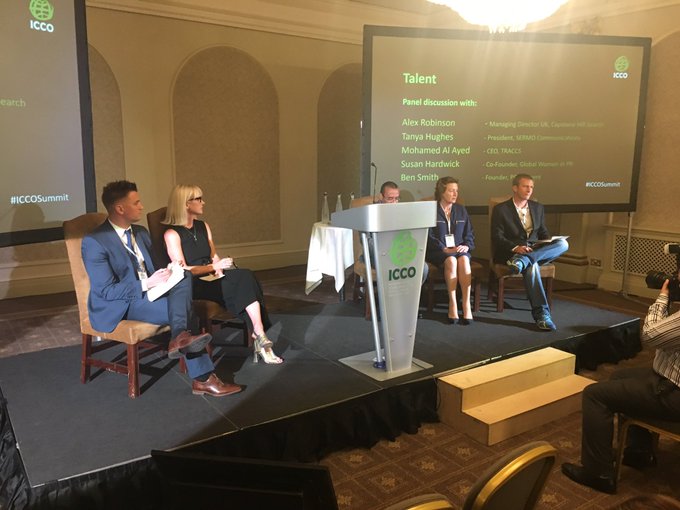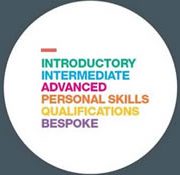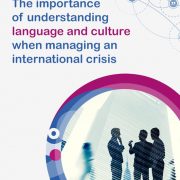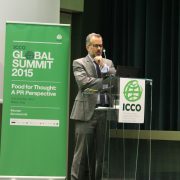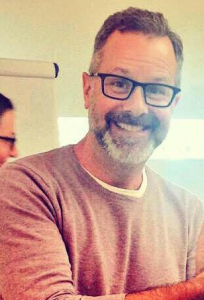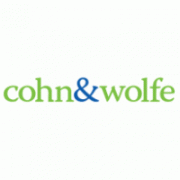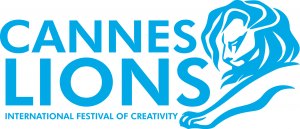
Maxim Behar, new president of International Communications Consultancy Organization (ICCO) and author of books on communication strategies, shares with PROI Americas his perceptions about the way global PR industry is going – and the main trends for the future.
The World PR Report 2015 informs that the global PR industry grew 7% in 2014. Will This trend continue in 2015 – or the global outlook is more challenging now for PR agencies?
The trend for growth will definitely continue, even I would predict more than previous year, but the business is changing so fast that almost nobody can de- scribe nowadays what the term “PR industry” means. Imagine you have three circles, partly overlapped, depending of the countries, regions and markets. The first one logically is the classical, traditional PR, the second is for our “cousin” from advertising and the third one belongs to a business born some more than a decade ago – digital agencies. Now those three circles are uniting step by step, directly speak- ing even every single day they overlap each other and there is a big dispute which one will prevail. Some say advertising; I say PR. Vision is very, very important in the modern communications, but we, in PR business, are not only “masters of text”, but we are much more experience of earning media and we will much faster learn how to manage them.
In your opinion, what are the most important changes in the PR industry in 2015? Should we have deep- er changes in the near future?
The most important change since the very start of PR business more than century ago is already matter of fact. Initially the difference between the PR and advertising was very clear – PR earn media, advertising buys media. The change now is that first time in history all we own media. Yes, media is our property, to me, to you, to everyone. From that perspective the task now is not to earn media, but to manage them professionally on behalf of our clients. And this will be the main change in the next years – we must learn how to manage media, how to provide our mes- sages in the most convincing way, how to keep the “third party” independence, presenting our clients’ projects. In fact this is completely new area for the PR business, which together with the social media and digital marketing “secrets” our teams must learn every day, even every minute.
How do you see the integration of communication (marketing, PR and digital)?
It is happening already since couple of years and the ones in PR business who do not do it yet are really totally late. The integration is simple. Always in our business we have starting point (client’s task) and tar- gets (possible results). The everything else would be the tools reaching the results. Now it is true – we own media, but this is not enough. Using visuals, movies is crucial for presenting the messages to the audience, which means that we take significant part from the advertising business. On the other hand there some- thing else, which also makes our business unique these days. First time in the history in fact PR business is absolutely measurable – we can say exactly how many views, clicks, likes, shares, followers have our messages, we can follow exactly the age, regional and interests structure of the targeted audience. This means that we already took a piece of the traditional marketing business, and this is enormous change for us. So, all those business are already integrated. It is on us, the PR professionals to set the speed of further integration and to change the business further. And we can do it just one way – in our office with our teams, on the brainstorming sessions, pitching and if for clients and with clients, changing our teams, involving new professions and skills into our office is not easy, I know. But otherwise the companies which are not changing with high speed will be simply out of the modern market.
Using visuals, movies is crucial for presenting the messages to the audience
Which sectors you see significant growth in the near future?
Obviously the highest growth will be in the crisis management. No matter it would be financial, health- care or IT sector. In the past, during the era of traditional printed media we had 8-10 hours basically to solve crisis and also 1-2 hours to respond top a TV coverage in case of crisis for our client. Now we do not have even more that two minutes. Once the news – right or wrong, true or false, is on the social media, then we must know exactly how to respond and how to overcome it. It requires deep knowledge, professional training and understanding the modern media. And also – understanding the world we live in, the brains of new generation, their interests, feelings and moods.
In recent years, technological changes led PR agencies to reinvent its business. Do you think this process will be also a reality in 2016?
It is not “reinvention”. In fact this is entirely new business, which I doubt in 10 to 12 years will be called further Public Relations. Our business had been established more than 100 years ago, at that time the majority of the relations were “not-public” and some of the were “public”, so there was a need of professional to manage the public side of the events. Now… everything, everything, everything is public. Those changes will also bring to the change not only of of the description of our business and change of the need of our clients, but also will bring a new name of our profession. Two early to say what it would be… Social relations, effective relations… Who knows, life is changing so fast, everything in our business is so dynamic that next year for sure will bring to us much more surprises than we can expect.
We saw in 2014 a growth of conglomerate PR groups. How this scenario affects the independent PR agencies?
My vision is that the independent firms will continue to grow and the conglomerates as you say, or big international networks will feel huge difficulties. And the reason is very simple – the slow decision making process and the sometimes too big bureaucratic machine. Very often I say – nowadays worst decision is better than no decision. Independent agencies, very often small and medium sized, are much more and easy to adjust to the clients needs and also faster and more effective to cut expenses. The big networks of course have their chances only if the face huge and immediate changes of the decision making process, both internally and also towards the clients’ needs. What small independent agencies are missing in fact would be the capacity and also the experience. In the times of social media this advantages of the big networks – having much larger number of people and much bigger experience I would say are less important if they do not change according to the new media environment. And it is a know rule that changes in the big structures happen much slower and often unpredictable than in the small ones.
What attributes, in your opinion, must be pursued by PR agencies to better fit in the current scenario and face its challenges?
Including new business in the offices – more people responsible for visuals – graphic designers, web developers, social media experts, editors…even movie producers. All the world’s business is moving into effective visual messages and it is a trend which was very easy to predict even some years ago. Also – the educations started to be more and more important, I really do not mean the academical education which in many cases is absolutely slow in changes, but the self education of our employees – every day and every minute.
In your opinion, which industry has been developing an outstanding PR strategy?
Mainly if services, healthcare and pharmaceutical and also retail business. Obviously these are businesses mostly exposed to the crisis and that is why the need of very proactive and attractive PR strategies is absolutely crucial. But also – PR itself also need a lot of PR. Not so many people, even within our industry understand the changes in the business, and also do not under- stand that Public Relations is one of the fastest changing business in the world. By the way – this is now one of its greatest beauties.
Public Relations is one of the fastest changing business in the world
How do you see the perspectives of PR industry for Americas?
Our business become more global than local. Americas, mainly Northern of course, are the moth- erland of Public Relations business and always will have a special role in its development. The English speaking world although becomes larger and larger every day and Europe and
Asia started being also very innovative, so Americas from that perspective must defend constantly its leading role in the public communications world.
Rio Olympics will, in your opinion, be a valuable opportunity for PR industry? Why?
Rio Olympics will not be a great opportunity; they will be really enormous one to promote the country and also its culture and history. Needless to say that sports has the most supporters and fans from any other area in our life. Use this unique chance to show the world how great and unbeatable is Brazil of creating history and spreading good and positive mes- sages globally.
How do you see the role of the PR professional in a increasingly digital world?
Just one word – leading! The Public Relations experts are the one who give the lights and proper messages already with the means of social media to billion.
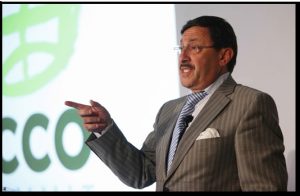
We already took a piece of the traditional marketing business and this is enormous change for us people all over the world. Our role is very special in- deed. We are the one to spread the newest trends of all businesses and must keep this role for the future. This is the reason we should keep very high ethical and professional standards. The whole world is watching our business, many other businesses are learning from us and it says everything about Public Relations now. Amazingly good business, which require every professional globally to have as a start just one important quality: sparks in his or hers eyes. It means a lot of knowledge, it means ambitious and motivation for growth and innovations and creativity. The rest is easy!
Original Article from PROI
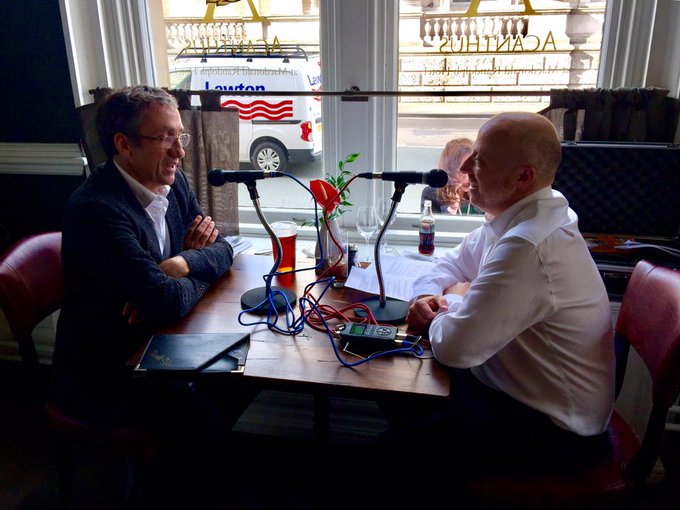 In Part 2 of Show 30 of the csuitepodcast (starting at 20:05), recorded at the Global ICCO PR Summit, I had the absolute pleasure of speaking with Pascal Beucler, Senior Vice President & Chief Strategy Officer, Global, MSLGroup (and someone I could have happily chatted to all afternoon), on the topic of ‘Brand culture in the conversation age’, which was the title of the presentation he had given at the conference earlier that day.
In Part 2 of Show 30 of the csuitepodcast (starting at 20:05), recorded at the Global ICCO PR Summit, I had the absolute pleasure of speaking with Pascal Beucler, Senior Vice President & Chief Strategy Officer, Global, MSLGroup (and someone I could have happily chatted to all afternoon), on the topic of ‘Brand culture in the conversation age’, which was the title of the presentation he had given at the conference earlier that day.




